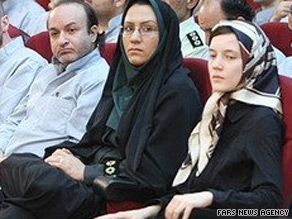
Iran has released a French academic from prison, though it’s not clear when Clotilde Reiss can return home, French President Nicolas Sarkozy’s office announced Sunday.
Reiss, 24, is the second French woman facing charges as part of mass trials in Iran who was released on bond. French authorities are now demanding that Iran drop all charges against Reiss and Nazak Afshar — an employee of the French embassy in Tehran who was released August 8, the statement from Sarkozy’s office said. They were arrested in connection with protests after the June 12 presidential election. Reiss will stay at the French embassy in Tehran while she awaits her return to France, the statement said. She has spoken with her father and is good health and spirits, it said. Iranian media reported Reiss admitted to crimes in court Saturday in connection with protests after the presidential election, and asked for clemency. “I shouldn’t have participated in the illegal demonstration and shouldn’t have sent the pictures, I am regretful,” the semi-official Fars news agency has quoted her as saying. “I apologize to the Iranian people and court and I hope the people and the court forgive me.” Human rights groups and Iran’s opposition leaders have accused the government of forcing people to make such confessions.
Don’t Miss
Security tight as Iran’s Ahmadinejad sworn in
Moussavi, Khatami blast Iran trials
In Depth: Iran election fallout
Iranian authorities arrested about 4,000 people amid protests against the controversial election, judiciary spokesman Ali Reza Jamshidi has said, according to the Iran Labor News Agency. He said 3,700 were released in the first week. But 100 defendants, including Afshar, Reiss, and an Iranian employee of the British embassy, appeared this month in Tehran’s Revolutionary Court at a mass trial on charges related to recent post-election violence. Thousands of Iranians took to the streets to protest the official result of the vote — the re-election of hardline President Mahmoud Ahmadinejad. The government said he won by a landslide, but his opponents accused officials of rigging the results. A crackdown by security forces followed, and at least 30 people died in the violence.